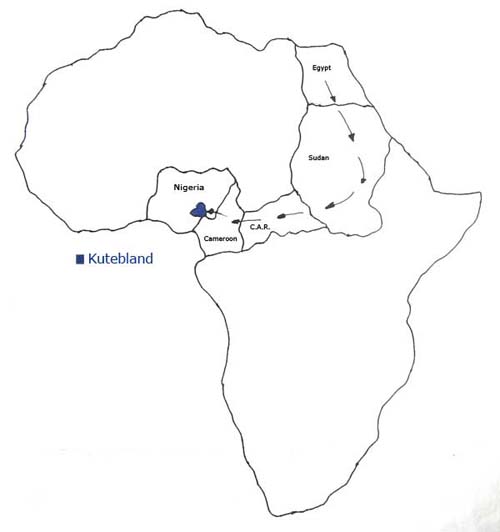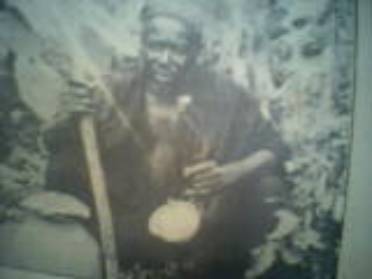THE KUTEB PEOPLE
LOCATION
South western Taraba State Nigeria and Western CameroonPOPULATION
600,000 in Nigeria and 2,000 in Cameroon.NEIGHBOURING PEOPLE
Jukun, Ichen, Tiv, Chamba, Tigon, Ndoro, BafumLANGUANGE GROUP
Yukuben-Kuteb in Benue-Congo classificationTYPES OF ART
Pottery making,Craft,BIOGRAPHY:
Origin
According to oral tradition and recorded history in colonial reports and books, there are two legendry accounts of the present day Kuteb People:First Account
That Kuteb people originate from a man called Kuteb. Kuteb begat two sons, Ussa and Uppa. Ussa got married to Iyaka and this union yielded Likam, Ayigben (Yukuben), Acha, Arucwu, Rubur, Ticwo, Askean, and Lumbu. Uppa married Kufyentirimam and gave birth to Arufun, Bika, Atwean and Acwumam.These Grand children of Kuteb today represent the various clan namesSecond Account
That Likam is the originating ancestor who begat Kuteb and other sons.The reconciling fact between the two legends is that firstly, Likam and Kuteb appear in both accounts. Secondly, the most acceptable legend is the first, which says Kuteb is their originating ancestor; hence the ethnic group uses Kuteb as their collective name of identification except, AYIGIBEN now seems to be a seperate ethnic group for reasons in (i) migration) below. Thirdly the fact that Likam was the most senior surviving descendant among other qualities, kuteb handed over the leadership of the nation to Likam, whence other children/descendants began to see Likam as their father, as well as the emergence of the name Mbarikam (Children of Likam).
Migrations
The Kuteb Nation earlier known as "Ndetirikwen" or "Zompere" is believed to migrate from Egypt into the interior of Africa under a leader called Kuteb in about 1000 BC. They moved into Central Africa and eventually to West Africa through Cameroon and settled on and around the hills of present day Takum. The name "Kuteb" eventually became the name of the tribe and the name of his sons became the name of the clans. Their first capital was Ussa Hill named after one of Kutebs sons.
At Ussa the major events that occurred include;
- Ayigben clan migrated far away and lost contact with the other kuteb brothers into the Kentu (ichen) area of Donga in search of game,then to the cameroon before finally coming to settle at their present abode at the mountain around Achillo hills south of Fikyu. They had so much mix with the Ichen,Mashi,and other tribes across the Camerounian border known to them as the Mbe'seme and Mbe'fe (SNP 17/3/298 P.15-16) that today ,they hadly identify themselves as Kutebs. This area (Ayigeben) was later known as Southern Zompere District in colonial records.
- By 1510, Kuteb apportioned the land to his
descendants. Each clan has its hill and land boundary,
which is marked by natural features like rivers and
streams. For peace, Kuteb ancestors warned that later
generations should not distort the boundaries what so
ever. The Kuteb capital was also transferred from Ussa
hill to Mbarikam hill by 1600 AD, Teekum (later spelt
Takum as it is now) developed south of Mbarikam hill.

Mbarikam hill viewed from Kwambai/Jenuwa road west of Takum.
The hill looks like a seat / throne and Takum is situated at the southern valley of the Hill.Takum(Teekum)is the traditional capital and seat of a modern Local Government.
- Again, before Kuteb died he declared Likam as the next leader of Kuteb nation.
- Furthermore a clan structure of Kuteb also developed at this period. Each clan, the surrounding land and the particular hill identified itself with the names of its ancestor, which were the Kuteb's Grandsons, and each city-state took the name of the clan and remained a single unit. For instance, Likam, Akente, Ticwo, etc.
- By the 19th century, some portion of Kuteb clans seceded and settled elsewhere forming separate clans. For instance, Arifun came out of Bika, Fikyu came out of Astwen (Kwambai); Kpambo-Puri came out of Ticwo (Kpambo), Lissam-Sambo and Lissam-Jatau came out of Askean (Lissam). The near settlements are entirely independent of the older clans. (K. Dewar Intelligence Report on Takum district 1935)
Politics
The earliest direction for every activity in Kuteb land revolve round the theocratic role of the Kwe Kukwen, Akwen and Council of elders called Ndufu who represent the major known sub clans and extended families. Kukwen is the Chief-Priest located in Mbarikam or Ikam or Teekum and the Akwen are the minor priests who are heads of the other clans. This practice started with Kuteb himself as the paramount chief priest / King of the Kutebs.The Kwe Kukwen may be chosen from any clan. However, he must, on his election, come to reside in Teekum (Mbarikam Hill) being the ward of Likam and the Headquarters of the Kuteb Nation
The traditional Kuteb political system is thus federal in nature. Even though the Kutebs recognised the seniority of Likam, the other clans had some autonomy to exercise powers of maintaining peace, protecting and achieving the interest of their respective clan members. However, such power ended where collective interest and programmes of the entire nation was to begin and where the settlement of disputes between individuals and clans were brought before the Kwe Kukwen.
In addition to the political role the Kukwen and Akwen have a spiritual role, responsibility and authority. The roles are rooted in the religious belief of the Kutebs.
Religion
The pagan Kuteb man worships idols "ipien" which he believed were the Good spirits of the Ancestors watching over the land in order to provide protection,peace,good farm yield etc.The particular type of idol worshiped depends on the Clan/family as it is passed on from father to the most beloved Male Child. With little or no history of the original "ipien"the heir continuous the ritual until such a time that he passes it on.The iki which is the physical manifestation of the "ipien" is being made during very special occasions e.g.the iki festival,the kuchechep festival,inauguration of the Ukwe, Burial of prominent individuals,when the Land needs cleansing; Nevertheless, the Kuteb believed in a supreme God called "Rimam" the maker of heaven and earth, the provider of rain, good health and harvest. They also believe that Kukwen is the intermediary between the people and Rimam, and between the people and their ancestors. And the laws governing Kuteb society are received through the Kukwen from Rimam.
Early Kutebs pay allegiance to the Kukwen as their paramount King. As such when two people are fighting and Kukwen happens to pass they must stop the fight immediately.
Today, many Kutebs are Christians with a few as Moslems.They converted to christianity as a result of the arrival in 1915 of Mr R.Whiteman and the subsequent establishment of the sudan Peoples Mission right in the heart of Kuteb land at Lupwe.The islamic Kutebs is as a result of the influence of the Hausa who came in from the North in 1930
S.U Mbge 1981
Administration
The religious and political duties of the Kukwen, was to organise the people, give the community direction, explain to them the basis of events for good health, economic prosperity, and provide protection through law and resolve conflicts. In case of breach of law he administer oaths, preside at trial by ordeal or administer sasswood, or performed the rukwen ritual depending on the Nature of the offence committed. The Kukwen also attends to the problems of individuals and solve them.Administratively, although each of the clans has their respective Kukwen, they met regularly under the leadership of the Kwe Kukwen (the Chief priest}. He is usually the eldest among them. The chief priest may be chosen from any clan. However, he must, on his election, come to reside in Takum being the ward of Likam, possessing the rukwen cult, which is always performed at Mbarikam hill.
The Kwe kukwen has officials chosen by him. The chief official being a male is called astho. The female among them is called WaKutswap. Here main function is to brew ceremonial beer called ujwab.
Judicial
Ever since the Kukwen was relived of civil authority, he no longer administer oaths, does not preside at trial by ordeal or administer sasswood, as that was exclusive responsibility of the Ukwe. But on intractable cases, the Kukwen intervenes to administer the supreme Kuteb oath of rukwen. However, generally, the Ukwe and His council of elders called mbakfan presides while Kwe ipein the chief diviner administer oath relating to Kissi (witchcraft) cases on persons accused; If need be the entire community will be assembled at Teekum (Assembly square) to a ceremony called Ndifu ngwa pein (meaning elders drink on oath) to fish out witches both men and women from among them. In drinking the guilty will die not too long after if he/she fails to confess and repent. At this square the Ukwe also presided over the Council of Clan Kwes.ADVENT OF OTHER TRIBES TO KUTEBLAND
During this period Kuteb land witnessed increased interaction with neighbouring ethnic groups like the Tiv , Wapan, Ichen and Kpazon in the Middle Belt region. And by 1830s there were already influx of these ethnic groups from the Cameroon. These groups came in various independent groups. Each group had its leader, which was not answerable to the other. Garkie led the Dinyi/Sama Donga group. The Kashimbila group were led by Modi and Gadin, and the Tikari who were the last group to come, were led by Kumboshi. It was this last group that led the campaign of extortion, kidnappings and war that Geared the Kutebs to re-organise and face the challenges of war. The campaign by the Kumboshis also attracted the British to under study the development in the area and signed a treaty with Kuteb King Ayipte in January 1884 to ensure that law and order was restored in Kuteb land.Law and order as it were was not attain until during the reign of Ukwe Ribom(1890-1912) that the British Royal Niger Company Led by Mr Hewby Subdue the rebels. Again, at this very challenging period the Kutebs modified the role of the Kukwen. The Kukwen and the Akwen were divorced of their political role to enable Kuteb nation cope with the exigencies of the nineteenth (19th) & twentieth (20th) century civilization. The present paramount civil ruler ship of the Kuteb, which goes by the title "Ukwe", and that of minor chiefs "Kwe" was created and given political, civil and military responsibilities and authority over the people. Nevertheless, traditionally, the Kukwen installs the Ukwe before Government official installation ceremony takes place.Below is the other tribe that join the Kuteb around the Mbarikam/(or Ikam or Takum) in order of arrival.
| Ichen during the reign ukwe Andejarikwe | 1775-1815 | |
| Kpanzo during the reign of ukwe Andejarikwe | 1775-1815 | |
| Chamba during the reign of ukwe Ganza | 1775-1815 | |
| Hausa; during the reign of ukwe Ayipte Garaya | 1855-1890 | |
| Tiv during the reign of ukwe Ahmadu Gankwe I | 1912-1925 |
20TH CENTURY KUTEBLAND
Today, Kuteb kingdom is divided into Takum and Ussa Local Government Areas with quite a population in Bali,Wukari,Ibi Local Government, all Situated in the southern region of Taraba state, in Nigeria.
In the 19th century due to population growth and inter-Tribal conflicts,members of the same clan split to form new towns like Kwesati,Tati-kumbo,Kufan Ahmadu,Lupwe,Tamiya,Tampa,Muchiya,Tutuwa,Muji and several others and of course this is the same reason for the presence of the Kuteb in the other Local Governments eg Nikin in Wukari.
The State Government created administrative Districts / Heads under the Ukwe Takum. The Ukwe Takum holds a 2nd class staff of office and recently (2005) is upgraded to a 1st class staff of office. The Ukwe is a member of Wukari Traditional Council and Taraba State Council of Chiefs. The seat is currently vacant following the passing away of the last occupant Alhaji Ali Ibrahim Kufang II on 22nd day of October 1996.
In addition to the Mbakfan (cabinet officials of the Ukwe and traditional kingmakers) namely, Kotubkwe (Hausa version: Madaki Takum) The prime Minister;) Itsekwe(Ajiya Takum)The coordinator of traditional rites,) Ndeyakwe(Galadima Takum) responsible for receiving quests before they are permitted to see the Ukwe;) Risu-nyisukwe(Yerima Takum) Fernkwe (Ubandoma Takum):
List of Clans and their Sub-Clans
1 Likam (Zomper or NIKen)
2 Rucwu(Akente)
3 Acwumam
4 Bika
5 Astwean (Kwambai,Fikyu Ndukwe,Fikyu Ndetso)
6 Rubur (Jeniwa Gida,Nyifeye,Kogi)
7 Atciwo (Kpambo puri,Yanki,Yashe,YIrom,Riyen)
8 Askaen (Lissam Sambo,Jato,KWesati,Yirom)
9 Lumbu (Lumbu Iya-ussa Kpakya.)
10 Rufu (Kunabe)
11 Acha (Acha Sarki,Acha-Nyim)
12 Ayigiben (Yukuben)
Traditional title-holders in Kutebland
1 Mallam Obadiah Rika - Garkuwan Takum
2 Danjuma S Nyapuru - Kyaten of Takum
3 Late Adamu Imbre - Shirten of Takum
4 Mr Amamra Riki - Ukam-Shagba of Takum
5 Matudi Kaigama -
THE KUKWEN
The Kukwen is the religious and spiritual leader of the people.To qualify for the position of Kukwen, the candidate must be pure. That is he is not a witch. A proof for this purity is that the candidate will be given the Kukwen's blue robe to wear. Secondly he will be submerged into Atkwe (a Pool of water). Any candidate that comes out without a single drop of water on his robe is then considered to be pure in mind and in spirit he is prepared to keep the taboos associated with the office. Consequently, he will continue to wear the robe. One of the taboos for the Kukwen is that He never touches strangers or baths; if he does the land will be ruined with poverty and famine.
See(Mgbe S.U 1973,1981: 76-78 more list of the taboos)

The Kukwen
On the death of a Kukwen of outlaying clan, his successor must visit the Kwe Kukwnen at Teekum to consult and receive instruction.
The combination of the political and spiritual powers on the Kukwens and Akwen, and the efficient and effective use of it by them account for the peaceful co-existence among the Kuteb clans. The strict compliance to the taboos associated with the office of the Kukwen also account for the outsider to wrongly feel the Kutebs had no chiefs, as the Kukwen was not easily seen, even when seen, not most definitely by strangers.
THE UKWE
The Ukwe is the Supreme Head of the Kutebland. In the proceeds of time as already ordain by KUTEB himself, this position is reserved for the Likam and Akente, which eventually appears that the value attached to seniority in Kuteb culture accounts for the retention of certain superiority by the Likam, and Akente the next most senior and neighbouring clan to Likam by being the source of the two royal families of Takum for the stool of Ukwe Takum. Even in modern Politics and Government, the seniority factor among the Kutebs still accounts for the need to consult the elders before final decisions are taken and acted upon.
An Ukwe has a level of superiority of status as a ruler amongst the other clan heads, nevertheless the Ukwe's position does not threaten or diminish the position of the Kukwens who still remains the religious and spiritual heads and also a fountain of counsel to the entire community.
Below is the list of Kuteb/Takum Kings since 1500 AD. Thus Ukwe and Kwe offices originated from the theocratic rulership of the Kukwen and the Akwen.
| Ukwe Likam Kuteb I | 1510-1550 | |
| Ukwe Rucwu Acha I | 1550-1600 | |
| Ukwe Kuteb Riyang II | 1600-1645 | |
| Ukwe Ajunkwe Acebuy | 1645-1695 | |
| Ukwe Andeburga Ricwu Acha | 1695-1730 | |
| Ukwe Kingham Gankwe I | 1730-1775 | |
| Ukwe Ganza Kwetsa | 1775-1815 | |
| Ukwe Atirikwe | 1815-1855 | |
| Ukwe Ayipte Gayara | 1855-1890 | |
| Ukwe Ribon Ipop Gamina | 1890-1912 | |
| Ukwe Ahmadu Gankwe | 1912-1926 | |
| Ukwe Hassan A Gankwe | 1926-1929 | |
| Ukwe Ibrahim Kufang | 1929-1938 | |
| Ukwe Audu Gyaa Ahmadu Kufang II | 1938-1963 | |
| Ukwe Ali Ibrahim | 1963-1996 |